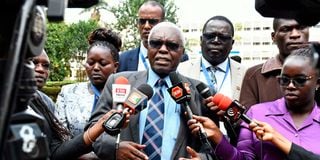Use school system to foster unity, improve quality of public service

Presidential Working Party on Education Reforms chairman Raphael Munavu addresses journalists at the University of Nairobi on November 11, 2022.
I wish to express concerns about the security of each citizen of Kenya, matters to do with national cohesion and the quality of public service and in the process raise questions on whether education can be utilised to solve the vices associated with these issues. Way back in 1996, the government of Botswana developed Vision 2016 and a roadmap to be taken to achieve that vision.
On ‘crime, peace and security’, it committed to ensuring that by 2016, every citizen of that country would be safe and secure. Twenty-seven years later, in Kenya, insecurity is worrying, based on the number of people killed and maimed on a daily basis. Some counties are officially gazetted as “dangerous and disturbed”.
Even those that are not in this category suffer high incidence of crime. Apart from the provisions of the Constitution of Kenya 2010 on civil liberties, establishment of the Police Service Commission, and strengthening of the Judiciary and correctional services, one hardly comes across a document detailing plans to pre-empt crime and secure the country as was the case in Botswana. We are largely reactive to crime.
The second is the thorny issue of national cohesion. In 1996, the ‘Report to UNESCO of the International Commission of Education of the Twenty-first Century’ was released. In the report, it was observed that “through the media, the public is becoming an impotent observer, even hostage to those who create and maintain conflicts; education up to now has not been able to do much to alleviate this state of affairs.”
Twenty-seven years later, one does not see much evidence of education being used to promote national cohesion. On the contrary, and due to economic challenges that are understandable, the school system is moving towards, strengthening “day schools” and “localisation’ of teachers to work in schools near their homes, thus reducing inter-ethnic interactions.
Employment of staff in each of the 47 counties has also been localised. At the national level, we are quick to count and tally the number of people from different ethnic communities once they are appointed to senior government positions.
Inward-looking
In short, we are becoming more inward-looking at a time when developed countries like Canada, the United Kingdom, the United States and Australia are opening up to skilled labour from developing countries irrespective of race. Our state of national cohesion is shaky at best, and much needs to be done to correct this. One would have thought that we would have utilised education to learn to live together.
The third issue of concern is quality of public service. I attended a workshop in Windhoek, Namibia, in 2001. We were taken through the service charters of several organisations and visited some of them, including the City Hall. The police charter in Windhoek stated that every crime reported in the city must be attended to within nine minutes. At the City Hall, any call from a landline had to be attended to before its fourth dial.
Twenty-two years down the line, would these examples apply to Nairobi, Kisumu, Mombasa or Nakuru? And would the services of the police in Kenya come anywhere near those in Windhoek in 2001? What is the quality of service in our public hospitals, schools, transport sector and universities? Do citizens expect and demand quality service?
If not, Why not? Have we accepted poor public service as a way of life? Has education helped to shape our attitude or not? What is it that we can do to change the situation? Can the Presidential Working Party on Education Reforms address these matters as incidental to their terms of reference two weeks before they wind up and hand in their recommendations to the government?
In Discourses, Machiavelli wrote that “Just as Rome once had Fabius as the best leader in times requiring that the war be drawn out, so later it had Scipio in times suitable for winning it”.
Allow me to paraphrase this statement by asserting that after more than 60 years of independence, a period during which public service and security concerns have been lethargic and national cohesion shaky, it is everyone’s wish that the new leadership can strategise through many ways — including education —to win the war against these vices.
Mr Sogomo is an education expert and former TSC [email protected], @Bsogomo.





